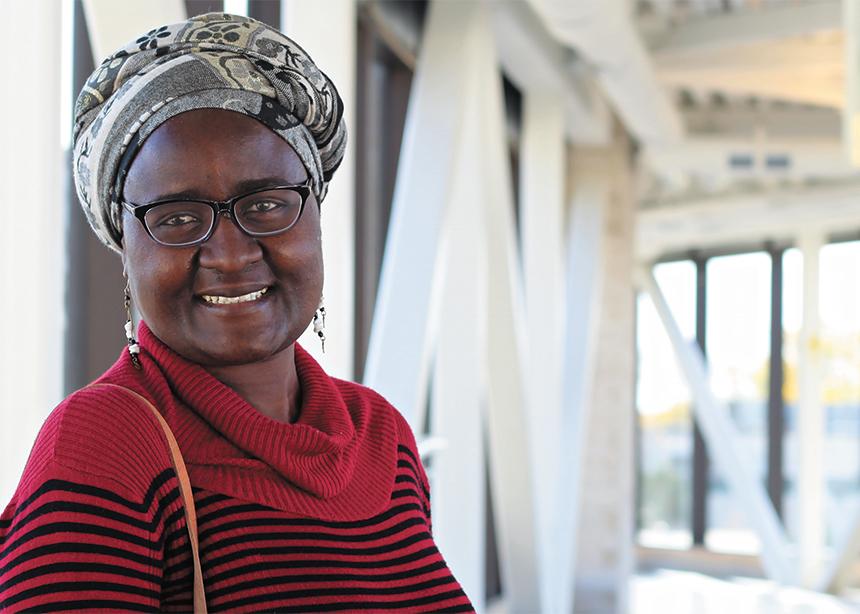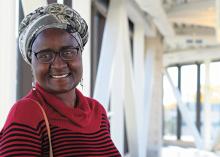Pamela Obonde came to Winnipeg from Nairobi, Kenya, in September 2019 to study in the master of arts in peacebuilding and collaborative development program at Canadian Mennonite University (CMU). But when the COVID-19 pandemic hit Manitoba in March, it threatened to foil all her plans.
“I remember the day very well, when things just started shutting down,” says Obonde, 50, who attends Ngong Mennonite Church in Kenya. Her family was scattered—she with her son in Winnipeg, and her husband and daughter back in Nairobi. Her lease was up, her on-campus jobs had ended when the university closed and her prospects of getting a summer job were slim. She didn’t know how she was going to pay for rent or tuition. “I kept on asking, ‘Is this the end of the world?’” she says.
When she sent a prayer to some women at Charleswood Mennonite Church, her Canadian congregation, she couldn’t believe what happened next. A couple from Charleswood invited her and her son to stay with them until she could pay rent again, and the church helped her buy groceries.
Then she received a bursary from the Mennonite Women Manitoba Working Group, which connects women across the province and supports women in leadership, and which inherited $24,000 when Mennonite Women Canada was dissolved a few years ago. These funds enabled the working group to provide the bursary, says chair Elsie Rempel.
“I have never experienced such love,” Obonde says. “It is just beyond my imagination. . . . Yes, COVID was a painful time, COVID was an ugly time. But to me, I can tell you that this is the time I saw the hand of God.”
Obonde is studying to further equip herself for her work in Kenya. She has worked with women and children there for the past 17 years. She began with vulnerable children living in the slums of Nairobi, then worked with women facing myriad obstacles like HIV/AIDS, stigmatization, lack of education, and being unable to own land or businesses. She fought to give Kenyan women a voice and to empower them with skills training and education.
In 2017, she felt called to bring her work into the Kenyan church. “I realized that the issues that I’ve been dealing with out in the secular world are three times in church, and nobody talks about them,” she says. “Why? Because the leadership is male.”
But when she started trying to bring women together to share stories and fellowship, it wasn’t easy. The women’s husbands, many of whom were pastors, questioned her agenda. When she explained that she just wanted to see what women could do when they connected, prayed and supported each other, the bishop objected. “He wasn’t comfortable with that,” she says.
With the help of Eastern Mennonite Mission, Obonde finally hosted the first women’s meeting. She used her training in Mennonite Women U.S.A.’s Sister Care program to begin facilitating Sister Care seminars in her own region. She helped found Anabaptist Peace Mission International, whose program trains and equips women in missional leadership.
“In Kenya, when we talk about mission, we think about . . . the white-skinned missionary,” Obonde says. She wants to demystify missions and show women they are called where they are. “For us women as mothers, we have been called in the home and that is our first mission field. . . . We’re already leaders in this place where we are.”
Obonde says it was difficult recruiting women into the program because they are stuck in the same cycle of thinking. Many experience domestic violence at the hands of their husbands, and their voices are not heard in church, despite making up three-quarters of the church members. “If we don’t come together as women, the church is not going to grow, our youth are not going to come to church, and the church will close down,” she says.
The support from the working group is meaningful to Obonde not only because it is helping her continue her peace studies, but also because she is passionate about Mennonite women collaborating across borders.
She wants women in Kenya to gain hope for the journey by learning about women in the Canadian Mennonite church who have been called into ministry, who speak their mind and have overcome some of the struggles they are currently facing in Kenya.
“How can the church here in Manitoba hold our hand . . . and how is it that we can put this fabric together so that when we lay out this fabric, everybody can look at their place, and we can together say, ‘Glory to God, we are working in the Kingdom of God.’ ”
While in Manitoba, Obonde has shared her story at a youth gathering, CMU’s Renew conference and working group meetings.
Do you have a story idea about Mennonites in Manitoba? Send it to Nicolien Klassen-Wiebe at mb@canadianmennonite.org.





Add new comment
Canadian Mennonite invites comments and encourages constructive discussion about our content. Actual full names (first and last) are required. Comments are moderated and may be edited. They will not appear online until approved and will be posted during business hours. Some comments may be reproduced in print.